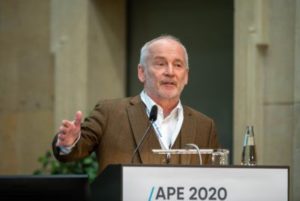The new author-centric form of publishing
Publishing sector must invest in developing new services to underpin Open Science expansion
In this podcast interview, Jean-Claude Burgelman, the Open Access envoy at the Directorate General Research and Innovation of the European Commission, in Brussels, Belgium, shares his views on the role of the science publishing industry in furthering the implementation of the Open Science agenda through shifting to author-centric services..
A day after he spoke at the scholarly publishing conference APE2020, mid-January 2020 in Berlin, Germany, he reflects on how to make Open Science a reality. As science publishers transition from a traditional subscription-based business model to an open-access business model, he insists on the need for a joint approach by policymakers and the public and private sectors in realising Open Science—combining open access publications and open data. “The best service we can give to our scientific community is to give them the available services and tools to do the science they want to do in the 21st century,” Burgelman points out.
State of Open Science
Burgelman is rejoicing that Open Science has now become a global issue. Not only is it a hot topic in Europe—where plan S is promoting open access publishing—but also in Asia and the Americas. Burgelman puts the slow uptake of the open-access business models among science publishers—which underpins the open science movement—into a wider context. He points to the similarities between this slow uptake and the lengthy transition that eventually led to e-commerce becoming the standard. “I don’t think we have done enough but we cannot push further,” he says, as such a move would go against the rule that prevents intervening in the market and interfering with Member States to create policies for Open Science.
However, he recognises the limits of the role of policymakers. “We need to join forces [with the science publishing industry],” he declares. Yet, he does not believe that publishers can have continuity of business without making an investment towards the transition to open access. “Switching to immediate open access is an investment for the future, it is not a cost.” He believes that it is impossible to go for immediate open access relatively fast without changing the business model, hence the need for investment from publishers. He compares this with the transition towards electric cars, which came at a cost to the private sector, but eventually also yielded rewards.

New publishing services for more author-centric services
“Our scientists do not need to know the whole policy discussion, they need to have the results [of an Open Access and Open Data policy],” Burgelman notes. Scientists intuitively grasp the benefits of having their publications or data openly available, if it also means having access to the publications and data from the rest of the scientific community—under open science policies.
This suggests that the science publishing community will have to make new author-centric services available. “The business will shift from a journal-based economy—where most of the money is made on the publication of the article—to a process-based economy—where a lot of the money will probably be made not only by the article but also by the services on top of the article, which make it easy for researchers to find data and identify results.”
“The business will shift from a journal-based economy—where most of the money is made on the publication of the article—to a process-based economy—where a lot of the money will probably be made not only by the article but also by the services on top of the article, which make it easy for researchers to find data and identify results”
– Jean Claude Burgelman
The result will be more opportunities for publishers based on more demand for publishing services. Burgelman believes that the more cross-publisher services are available, the better. But he has one caveat: that these services are compatible in order to avoid having clusters of services. That’s where the European Open Science Cloud comes in. It is designed to host a range of services that will only blossom if they are inter-operable. He draws a parallel with the advent of the internet which possesses robust standards for interoperability to avoid having mini-internets coexisting side by side. “The raw material to develop the service will be [FAIR digital research objects],” (which follow the principles of Findability, Accessibility, Interoperability and Reusability).
Wider audiences in the author-centric community
When it comes to communicating the outcome of research to wider audiences, there is a silver lining in open access. “In essence, Open Science lowers the barrier to accessing scientific knowledge.” Thus, open access represents an essential step in the road to Open Science and its benefits. However, Burgleman adds: “Will it mean that [scientific research] will be more intelligible for non-scientists, I don’t think you can equate the two. There is no correlation, let alone causality between the two.” Open access does not mean that everyone will suddenly know what a black hole is, he notes, jokingly.
However, providing access to scientific knowledge unleashes a greater potential for professional science communicators to do what they do best—make science understandable to a wider audience. It also opens up opportunities for the realisation of citizen science projects. Although translating research findings into an accessible language for wider audiences is challenging and should be done carefully, this is not an insurmountable problem, and it should be seen as the next step to Open Science.
Sabine Louët, Founder SciencePOD

